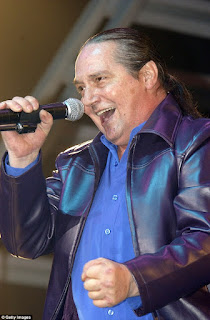Stephen Carlton Wright (20 December 1947 – 27 December 2015), better known as Stevie Wright (formerly billed as Little Stevie), was an English-born Australian musician and songwriter who has been called Australia's first international pop star.
Wright was born in Leeds, West Yorkshire, but in 1958 his father, Staff Sergeant George Wright, took the family to Melbourne under the Australian government’s assisted migrant scheme. In 1960 they moved to Villawood, near Sydney, and lived near the Villawood Migrant Hostel, a sprawling colony of corrugated iron huts. Wright began getting involved in pop bands in his mid-teens, and performed with the Outlaws and then Chris Langdon & the Langdells, who initially played surf music before falling under the influence of the Beatles.
While performing at Suzie Wong’s Chinese restaurant, Wright was approached by two future Easybeats, Vanda (born Johannes Hendricus Vandenberg) and Dick Diamonde (real name Dingeman Van der Sluys). Both were immigrants from the Netherlands staying at the migrant hostel, where they were part of a vibrant amateur music scene also frequented by Young, who had arrived from Glasgow in 1963. With Wright aboard, they recruited the Liverpool-born Gordon “Snowy” Fleet to play drums, and it was he who suggested the name Easybeats, a nod to both British beat music and the Beatles.
The group secured themselves a residency at the Beatle Village club, and it was there that they were spotted by the music publisher and producer Ted Albert. He signed the band to his own Albert Productions and secured a deal with EMI/Parlophone. Their first single, For My Woman (1965), made it to No 33 in the Australian chart, and the follow-up, She’s So Fine, rocketed to No 3.
Between 1965 and 1969, the Easybeats notched up 14 Top 40 hit singles in Australia, including the EP Easyfever as well as with the Wright/Young composition Sorry, but the huge success of Friday on My Mind marked their peak.

Wright became less influential as Vanda and Young became the dominant songwriters (though Wright’s twisting, leaping, shaking stage performances remained uniquely his), but despite their efforts the group’s star waned inexorably. Fleet quit, having tired of being separated from his family, and after a string of decreasingly successful singles, the Easybeats disbanded in 1969.
Young and Vanda went on to great success as a writing and production team and became closely involved in the early career of Australia’s most successful band AC/DC, Young being the older brother of the band members Angus and Malcolm Young. Wright, meanwhile, tried to launch a solo career, fronting groups including the Stevie Wright Band and Stevie Wright & the Allstars.
In 1972 he gave an acclaimed performance in the role of Simon Zealotes in the Australian production of Jesus Christ Superstar, but began taking heroin while working on the show. In 1974 he enjoyed his biggest solo success with the three-part single Evie, an 11-minute work written by Vanda and Young which gave him a No 1 hit. Its parent album, Hard Road, reached No 2 on the Australian charts, and Evie (Part 1) was covered by Rod Stewart on his album Smiler.
Heroin addiction prompted Wright to try the controversial drug-induced deep sleep and electroconvulsive therapy treatment, which left him with serious mental health problems. His performing and writing were subsequently erratic, though he emerged from further rehab treatment in 1979 to perform Evie for a 100,000-strong crowd on the steps of the Sydney Opera House. In 1986, he joined a brief Easybeats reunion tour, and undertook some solo work with his own band over the next couple of years. In 2005 he was inducted into the Australian Recording Industry Association Hall of Fame with the Easybeats, and he made his final live performance in 2009.
Wright retired and lived on the South Coast of New South Wales. In 2013 he was hospitalised after suffering a seizure and found to be suffering liver, kidney, lung and stomach disorders. He told The Daily Telegraph he had been sober for more than 25 years and completed his methadone program a decade beforehand.
He died on 27 December 2015 at Moruya Hospital of pneumonia. His funeral was held at St Andrew's Cathedral in Sydney on 8 January 2016. He told The Daily Telegraph he had been sober for more than 25 years and completed his methadone program a decade beforehand. (Edited mainly from article by Adam Sweeting @ The Guardian & Wikipedia)








